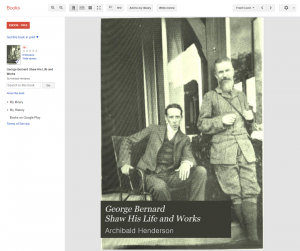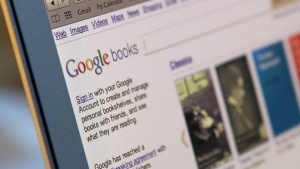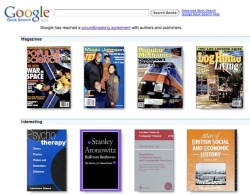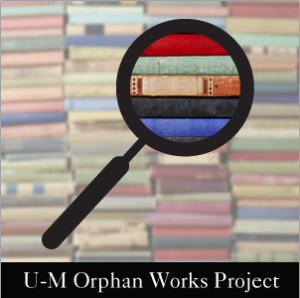Google Books
|
Google Books is a Google Inc. project in which Google digitizes books that are either in print or out of print and store them in their database. For books that are protected under copyright laws, Google has provided snippets of the text to ensure the user has found what they are looking for and included links to the publisher or other websites where the user can purchase the book. For books that are not protected under copyright laws, Google provides access for individuals to read the entirety of these books. Google has faced numerous legal battles from publishing companies and authors over the Google Books project who claim that Google has infringed upon their copyright claims. Google has tried to create a system that does not infringe on the rights of book owners and stringently opposes the idea that they are doing wrong to these writers and publishers. With the increasing ability to access and share more information online, the ethical line between the rights of Google and the creators or publishers of these works has been blurred. Many universities and other organizations are aiding Google on their quest. These include the University of Michigan, Harvard University, New York Public Library, the University of Oxford, and Stanford University.
Contents
Scanning Books
Google has scanned over 25 million books (out of roughly 130 million), most of which are from library partners. [1] The company plans to finish the rest of them by 2020. Books are put through a scanner and the pages are ‘read’. After it is put through the scanner, it is ‘read’ again by a computer program which converts the image into characters using optimal character recognition. It is then stored in a database for use on Google Books.
Book Snippets
For books that Google does not have permission to display, a snippet of the book is provided. These snippets can range from a few pages to a couple hundred pages. Google's Partner Program makes more than a few sentences available for user viewing online. This program is an agreement between Google book owners to entice their readers into buying a copy of the book. With the snippets, a list of online retailers who are selling the book and a list of libraries where the book is available is included. There is a also a list of related books available for readers. The page also contains reviews of the book as well as links to all the other books written by the same author.
Books For Public Use
Books that are in the public domain or have been released by their owner for use in this project are fully available. These virtual books are fully searchable and available as a PDF file or just as it was scanned. Google also provides the same reviews, ratings, and related books on the page. There are also opportunities to buy either a digital copy or a hard copy at a variety of retailers. The intent is to provide individuals with access to works they may not have otherwise had access to.
Libraries
Users have the option to add books to their personal libraries, which are hooked up to their Google accounts. Users search for a book or for a subject in the search bar of the site and their results pop up, much like how the search engine functions. There are options for buying books via Google Play, online sellers, or for renting the titles at local libraries. If the book users wish to read is not available on any of these platforms, the site offers a list of similar books.
Users' libraries are created by users with books they want to read, have read, or need to read. With academic books, literary works, and essentially every form of written word available, users can customize their libraries and share that with their followers on Google+ and with their family members/friends. A title that has been purchased or added to one user's library can be sent via email to other users and they can in turn save the title to their libraries.
Orphan Works
An orphaned work is any piece of work (art, film, book, poem, etc.) that does not currently have a rightsholder — the publisher may have gone bankrupt and there are no collection of their records, records may have gone out of date, the author may have died, and the heirs cannot be found, etc. Orphan works are estimated to be between 1.5 and 6 million books. A digitizing entity could go bankrupt trying to find the copyright holder. Under the original Google Books project, orphan works fell under the fair use argument. But with the given settlement, Google and the public have significantly greater access to the orphan works, even though they have the possibility of still being in-copyright.
Court Issues
Starting in 2005, Google began experiencing legal trouble with regard to its use of scanned material. Google had been providing its users with access to books that, although out of print, still had active copyright laws. Google has attempted to make settlements with the Author’s Guild and there has been much progress. However, a US District Court ruled that resulting terms were not “fair, adequate, and reasonable”. Google offered to give book owners a flat rate per book plus royalties on the advertising done on the book's page, totaling 63% of revenue.[2]
A Settlement was reached in October of 2008. What surprised many observers was the breadth of the settlement, which covered more than Google had originally intended for the Books project. [3] The settlement applies only to books that published before January 5, 2009, does not include periodicals or books that under the public domain ( they do not need copyright protection).
The settlement allows Google to offer three services to users that are located in the United States:
- Previews - users can search Google's entire database of digital books and get a response to searches for free. Google can display up to 20% of the book's text in response. The user can receive more pages of out of print books than in print books
- Consumer Purchases - Users can purchase perpetual access to the full text of the book. They cannot make in print book available unless the copyright owner opts in. Google can change the price of the book in response to demand.
- Institutional Subscriptions -Users within an institution can view the full text of all books within the Institutional Subscription Database. Institutions include educational facilities, businesses, libraries, etc.
The settlement was rejected by the courts and there is currently no timeline for when this case will be resolved.
Partners In Digitization
Google began asking university libraries in 2004, receiving permission from well-known institutions such as the University of Michigan, Harvard, and the University of Oxford. Today there are over 20 institutions in several countries providing Google with books to digitize. Many of these institutions have gone on to create the Hathi Trust Digital Library, which has many similar functions to Google Books [4]. Hathi Trust is being sued in a separate case by the Authors Guild [5].
Benefits for Society
Upon completion (near completion because there will always be more books being produced) of this project, all of the books of today will be archived. This digitalization will protect these works against aging effects. More importantly, it will provide individuals access to a multitude of books that were once available to only a small audience. This project will also provide access to literature that would not have been available to parts of the world. By including features that allow individuals to search through any document, Google will also make it easier to find information within a larger scope.
Ethical Concerns
The legal battle between Google and many publishing firms stems from copyright issues. On the web, a rising concern has been people who pirate copyrighted material. Many of those books are protected by copyrights, and Google is requiring copyright holders to opt out of the scanning process if they don't want their books in libraries to be searchable. The web is a place where information can be easily obtained, whether legally or illegally. The lawsuits against Google, speak towards the controversial, yet innovative, program they are attempting to implement. As this program begins to progress, the issue of copyrighted material will surely be a concern for those involved. Google established a precedent for rights holders to bear the burden of protecting their works rather than the other way around. Historically, the potential user of copyrighted material had to get permission to do so. Rights holders now have to take a more active role protecting their property.
Print Program
The Print Program has two components, one for publishers and one for libraries. Under the Google Publisher Program, the company is working with book publishers to make titles searchable and easy to purchase. The search result pages include advertisements if publishers want them, and most of the revenue goes to the publishers, Google said. The controversial part of the Print Program, which has prompted two lawsuits so far, is the Print Library Project. Under the Library Project, the search giant is scanning, digitizing and making searchable parts or all of the collections from Stanford University, Harvard University, the University of Oxford, the University of Michigan, and the New York Public Library. Google says it will scan copyright protected books from libraries unless the publisher or copyright holder expressly opts out. If the book is copyright protected, there is minimal text, only a few sentences, or "snippets," surrounding the keywords searched. [6]
Orphaned Works
An issue that has risen out of the Google Books cases is what to do with Orphaned works, or works which were published, but which currently have an unknown copyright status, whose owner can not be found or contacted, and which are no longer being published. Because the copies are unavailable in the marketplace some argue that they are orphaned works can be distributed under the Fair Use Clause of the US Copyright law [7] Others such as the Authors Guild argue that orphaned works can still not be printed as it violates the authors ownership of works and support alternative methods such as the Canadian system where a license is paid to use orphaned works and if the author claims their work they can receive the license fee [8]. Under the stalled court settlement Google would have adopted a system more similar to the Canadian process, but the courts felt they were not in a position to designate what process the US uses. It does not appear as if Congress will create legislation on this issue in the near future.
See Also
External Links
References
- ↑ [1] "About." Google.
- ↑ [2] "Google Books Settlement: The Authors Guild against Google Inc.." Scribd.
- ↑ Bellia, Patricia M., Paul Berman, Brett M. Frischmann, and David G. Post. Cyberlaw: Problems of Policy and Jurisprudence in the Information Age. 4th ed. St. Paul: West, 2007. Print. American Casebook Ser.
- ↑ [3] Hathi Trust Digital Library. Hathi Trust.
- ↑ Rosenthal, E. H., & Goldman, J. (2011). The Authors guild, Inc. Hathi Trust: New York.
- ↑ Mills, Elinor. Google's battle over library books. CNET, Sept. 2011. Web. 7 Dec. 2011.
- ↑ (n.d.). Copyright Law of the United States of America and Related Laws Contained in Title 17 of the United States Code. [4].
- ↑ Canada Copyright Act (R.S.C., 1985, c. C-42). (n.d.)




